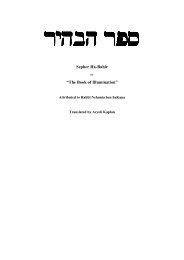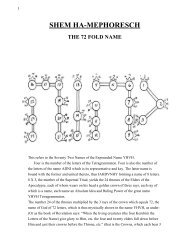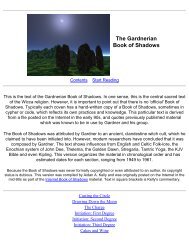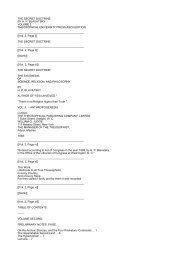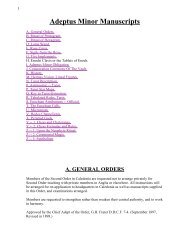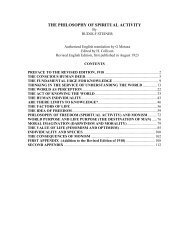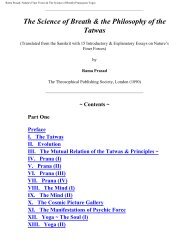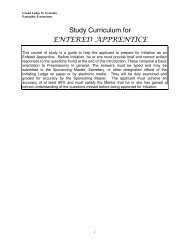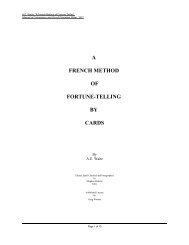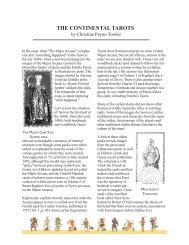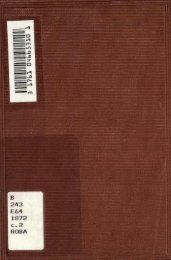You also want an ePaper? Increase the reach of your titles
YUMPU automatically turns print PDFs into web optimized ePapers that Google loves.
The Gods Of The <strong>Book</strong> Of The <strong>Dead</strong>.<br />
Egyptians <strong>of</strong> <strong>the</strong> XVIIIth dynasty from a moral as well as from a physical point <strong>of</strong> view.[6] Apep, <strong>the</strong><br />
emblem <strong>of</strong> evil, was here punished and overcome, and here dwelt <strong>the</strong> souls <strong>of</strong> <strong>the</strong> wicked and <strong>the</strong><br />
righteous, who received <strong>the</strong>ir punishments or rewards, meted out to <strong>the</strong>m by <strong>the</strong> decree <strong>of</strong> Ra and his<br />
company <strong>of</strong> gods. The chief instruments <strong>of</strong> punishment employed by <strong>the</strong> gods were fire and beasts which<br />
devoured <strong>the</strong> souls and bodies <strong>of</strong> <strong>the</strong> enemies<br />
[1. See below, p. 258.<br />
2. Naville, Todtenbuch, Bd. I., Bl. 49.<br />
3. Lepsius, Todtenbuch, Bl. 17.<br />
4. ###. Naville, Todtenbuch, Bd. I., Bl. 184.<br />
5. See Maspero, Les Hypogées Royaux de Thèbes, p. 76.<br />
6. See Lefébure, <strong>Book</strong> <strong>of</strong> Hades (Records <strong>of</strong> <strong>the</strong> Past, vol. x., p. 84).]<br />
{p. cxxxi}<br />
Traditions about hell preserved in Coptic times.<br />
<strong>of</strong> Ra; and we may see from <strong>the</strong> literature <strong>of</strong> <strong>the</strong> Copts, or Egyptians who had embraced Christianity,<br />
how long <strong>the</strong> belief in a hell <strong>of</strong> fire and torturing fiends survived. Thus in <strong>the</strong> Life <strong>of</strong> Abba Shenuti,[1] a<br />
man is told that <strong>the</strong> " executioners <strong>of</strong> Amenti will not show compassion upon thy wretched sol,"[2] and in<br />
<strong>the</strong> history <strong>of</strong> Pisentios, a Bishop <strong>of</strong> Coptos in <strong>the</strong> seventh century <strong>of</strong> our era, we have a series <strong>of</strong> details<br />
which reflect <strong>the</strong> Tuat <strong>of</strong> <strong>the</strong> ancient Egyptians in a remarkable manner. The bishop having taken up his<br />
abode in a tomb filled with mummies, causes one <strong>of</strong> <strong>the</strong>m to tell his history.[3] After saying that his<br />
parents were Greeks who worshipped Poseidon, he states that when he was dying already <strong>the</strong> avenging<br />
angels came about him with iron knives and goads as sharp as spears, which <strong>the</strong>y thrust into his sides,<br />
while <strong>the</strong>y gnashed <strong>the</strong>ir teeth at him; when he opened his eyes, he saw death in all its manifold forms<br />
round about him; and at that moment angels without mercy came and dragged his wretched soul from his<br />
body, and tying it to <strong>the</strong> form <strong>of</strong> a black horse <strong>the</strong>y bore it away to Amenta. Next, he was delivered over<br />
to merciless tormentors, who tortured him in a place where <strong>the</strong>re were multitudes <strong>of</strong> savage beasts; and,<br />
when he had been cast into <strong>the</strong> place <strong>of</strong> outer darkness, he saw a ditch more than two hundred feet deep<br />
filled with reptiles, each <strong>of</strong> which had seven heads, and all <strong>the</strong>ir bodies were covered as it were with<br />
scorpions. Here also were serpents, <strong>the</strong> very sight <strong>of</strong> which terrified <strong>the</strong> beholder, and to one <strong>of</strong> <strong>the</strong>m<br />
which had teeth like iron stakes was <strong>the</strong> wretched man given to be devoured; for five days in each week<br />
<strong>the</strong> serpent crushed him with his teeth, but on <strong>the</strong> Saturday and Sunday <strong>the</strong>re was respite. Ano<strong>the</strong>r picture<br />
<strong>of</strong> <strong>the</strong> torments <strong>of</strong> Hades is given in <strong>the</strong> Martyrdom <strong>of</strong> Macarius <strong>of</strong> Antioch, wherein <strong>the</strong> saint, having<br />
restored to life a man who had been dead six hours, learned that when he was about to die he was<br />
surrounded by fiends, some <strong>of</strong> whom had <strong>the</strong> faces <strong>of</strong> dragons, o<strong>the</strong>rs <strong>of</strong> lions, o<strong>the</strong>rs <strong>of</strong> crocodiles, and<br />
o<strong>the</strong>rs <strong>of</strong> bears. They tore his soul from his body with great violence, and <strong>the</strong>y fled with it over a mighty<br />
river <strong>of</strong> fire, in which <strong>the</strong>y plunged it to a depth <strong>of</strong> four hundred cubits; <strong>the</strong>n <strong>the</strong>y took it out and set it<br />
before <strong>the</strong> judge <strong>of</strong> Truth. After hearing <strong>the</strong> sentence <strong>of</strong> <strong>the</strong> judge <strong>the</strong> fiends took it to a place <strong>of</strong> outer<br />
darkness where no<br />
[1. See Amélineau, Monuments pour servir à l'Histoire de Égypte Chrétienne, p. 167.<br />
2 ###.<br />
http://www.sacred-texts.com/egy/ebod/ebod09.htm (18 <strong>of</strong> 19) [8/10/2001 11:23:59 AM]




